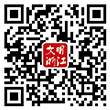168則傳世家訓(xùn)173位清官,這個(gè)家族怎么做到的
家風(fēng)是一家或一族世代相傳的道德準(zhǔn)則、處事方法和精神風(fēng)貌,是一個(gè)家庭的精神內(nèi)核。良好的家風(fēng)對(duì)一個(gè)家族發(fā)展至關(guān)重要。浙江浦江鄭宅鎮(zhèn)的鄭義門就是一個(gè)很好的典范。
鄭氏家族以廉儉孝義治家聞名于世,洪武十八年(1385年),明太祖朱元璋親賜“江南第一家”。長(zhǎng)達(dá)168則的傳世家訓(xùn)《鄭氏規(guī)范》,更是被譽(yù)為中國(guó)傳統(tǒng)家訓(xùn)的重要里程碑。其事載入《宋史》《元史》《明史》。
注重教育,鄭氏義門屢受旌表
浙江省金華市浦江縣鄭宅鎮(zhèn)是鄭氏家族世代繁衍的集中地,鄭氏的傳世故事在當(dāng)?shù)赜锌诮员?/p>
據(jù)史書(shū)記載,鄭義門合族而居十五世,歷宋、元、明三朝。明代嘉靖《浦江志略》稱,“合族聚食而雍睦恭謹(jǐn),不殊乎父子兄弟之至親,宋元國(guó)朝屢旌其門。”
不僅如此,鄭氏家族還注重對(duì)子弟的教育培養(yǎng),自宋朝開(kāi)始,鄭義門培育的政治精英與知識(shí)精英在地方上甚至在全國(guó)范圍名聲顯赫的大有人在,宋、元、明三朝正史中列名的就有21人。現(xiàn)存于“鄭氏宗祠”中的眾多匾額如“孝義家”“麟鳳世家”“代有完人”“立德不朽”“世篤忠貞”,標(biāo)志著歷代統(tǒng)治者對(duì)鄭義門的褒獎(jiǎng)。
鄭義門在宋、元、明三朝得到諸多褒獎(jiǎng),明代猶盛。明洪武十八年(1385)七月,家長(zhǎng)鄭濂赴南京覲見(jiàn)皇上。朱元璋問(wèn)鄭“治家之方”,鄭對(duì)曰:“謹(jǐn)守祖宗成法”并呈《鄭氏規(guī)范》。朱元璋嘆道:“人家有法守之,尚能長(zhǎng)久,況國(guó)乎!”他對(duì)鄭說(shuō):“你今后每歲朝見(jiàn),可與顏、曾、思、孟子孫來(lái)朝者同班行禮。”洪武二十三年,朱元璋又親書(shū)“孝義家”三個(gè)大字以賜。
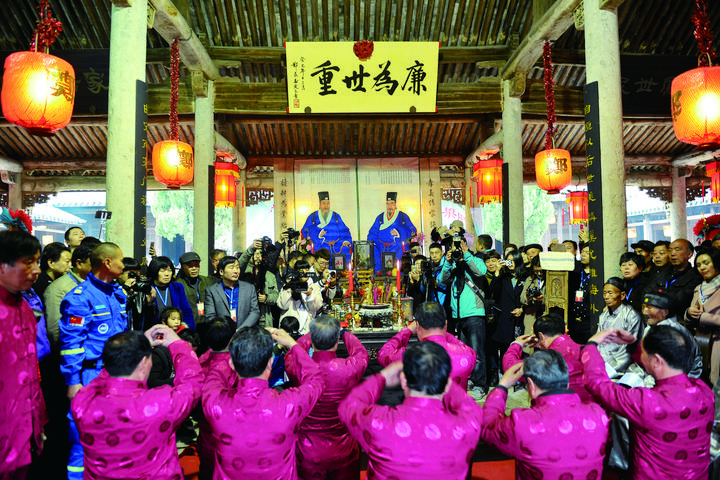
浦江縣鄭宅鎮(zhèn)的鄭氏后裔和來(lái)自全國(guó)各地的鄭氏同宗,集體參加文化踩街、祭祖儀式。
鄭義門子弟還多有被破格提拔委以重任的。洪武二十六年,朱元璋特召鄭義門子弟三十歲以上者赴京聽(tīng)用,最終選中鄭濟(jì),授其“左春坊左庶子”一職,實(shí)際為皇太孫伴讀,職責(zé)是將“家庭孝義雍睦之道,日夜講說(shuō)于太孫之前”。洪武三十年,又親授布衣鄭沂為禮部尚書(shū)。朱元璋將糧長(zhǎng)出身的鄭沂一舉推為顯官,利用鄭氏的治家準(zhǔn)則來(lái)推行理國(guó)之道,這種情況在整個(gè)封建社會(huì)的歷史中也是少見(jiàn)的。
經(jīng)過(guò)歷代統(tǒng)治者的不斷表彰,尤其是朱元璋賜封鄭義門為“江南第一家”之后,鄭氏家族日益步入它的鼎盛時(shí)期,儼然是一個(gè)規(guī)模宏大、組織嚴(yán)密、掌執(zhí)明確、結(jié)構(gòu)得體的大家族,參與政治的熱情也更加高漲。據(jù)《鄭氏歷朝仕宦題名》載,宋代鄭氏家族僅有兩人從政,到元代已有14人,明初被委以重任者有47人之多,其中有禮部尚書(shū)鄭沂、內(nèi)藏庫(kù)提點(diǎn)(掌管宮廷貴重物資存儲(chǔ)的職位)鄭洪、翰林院待詔鄭洽等。
168則規(guī)范,朱元璋借以治國(guó)
走在古色古香的鄭宅鎮(zhèn)小街巷,很容易觸摸到與鄭氏家族有關(guān)的生活細(xì)節(jié),小鎮(zhèn)上一副楹聯(lián)、一塊碑文、一座亭子都留存著歷史的濃郁痕跡,鄭氏宗祠門前兩旁的“耕”“讀”“忠信孝悌”“禮義廉恥”10個(gè)大字,經(jīng)過(guò)儒家的“孝義”理念的長(zhǎng)期浸潤(rùn),逐漸演化為長(zhǎng)達(dá)168則的《鄭氏規(guī)范》,涵蓋治家、教子、修身、處世等方方面面,形成了環(huán)環(huán)相扣、完整的家族管理體系,也成為族人歷世承襲的行事“密碼”,使鄭氏家族在處理與社會(huì)的關(guān)系時(shí)游刃有余。
鄭義門第一世先祖鄭綺、鄭緼兄弟開(kāi)創(chuàng)了“以孝治家”家風(fēng),并逐漸形成了“行之一身,則一身正;行之一家,則一家順;行之一郡,則一郡理;行之四海,則四海翕然稱化”的治家格言。鄭綺在臨終前還留下遺囑:“吾子孫有不孝不悌、不共財(cái)聚食者,天實(shí)殛罰之。”這為鄭氏家族合食共居及規(guī)范的制定確立了“行動(dòng)框架”。
鄭義門第五世主持家政的鄭德璋提出“以法齊家”的思想,并初步制訂“治家準(zhǔn)則”,為鄭氏家族長(zhǎng)久合居奠定了更為堅(jiān)實(shí)的基礎(chǔ)。其子鄭文融(又名鄭大和)又在此基礎(chǔ)上制定了《鄭氏家范五十八則》,家長(zhǎng)正身率下,家中呈現(xiàn)內(nèi)外雍肅、秩序井然的局面。“雖家庭中,凜如公府,子弟小有過(guò),頒白者猶鞭之”“子孫從化,馴行孝謹(jǐn),不識(shí)廛市嬉戲事”“食貨田賦之屬,各有所司,無(wú)敢私”。(宋濂《浦陽(yáng)人物記》)
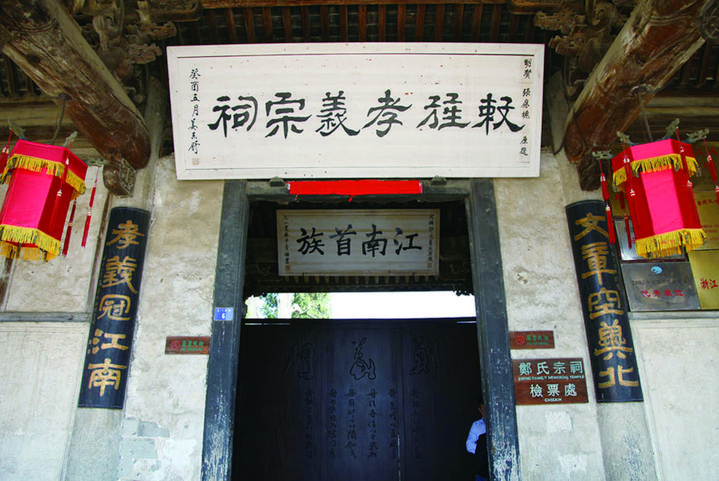
鄭氏祠堂。
至第八世鄭濤時(shí),在之前規(guī)范條文的基礎(chǔ)上加以刪益,修訂為168則。當(dāng)時(shí)宋濂作為鄭義門的精神文化導(dǎo)師,參與了《鄭氏規(guī)范》的審訂。此后,這部《鄭氏規(guī)范》(以下簡(jiǎn)稱《規(guī)范》)就一直相沿使用。
《規(guī)范》極為廣博,有學(xué)者把《規(guī)范》168則按內(nèi)容分為十類,包含神主、家長(zhǎng)、掌事、儀禮、仕規(guī)、睦鄰、長(zhǎng)幼、修身、儉謹(jǐn)?shù)确懂牐瑤缀跎婕肮糯蠹易迳畹姆椒矫婷妗!兑?guī)范》兼具訓(xùn)導(dǎo)與法規(guī)的功能,可操作性強(qiáng)。無(wú)怪乎朱元璋在宋濂推薦下看到《規(guī)范》后如獲至寶,令有司借鑒鄭氏治家之道,用于明初國(guó)家禮儀、律法、政策的制定。
家規(guī)為尺,孝義傳家九百年
從《規(guī)范》的內(nèi)容看,基于儒家文化傳統(tǒng)的“孝”和“義”,正是這部治家規(guī)范的核心。
《規(guī)范》之所謂“孝”,乃是一種尊祖敬宗、孝順父母的縱向情感。廣而言之,凡能恪守正道、勤于事業(yè)、奉行先祖遺訓(xùn)等行為皆屬于“孝”的范圍。所謂“義”,則包括奉公守法、堅(jiān)持正義、辦事合理和維系平輩之間友好關(guān)系的橫向情感。《規(guī)范》云:“吾家既以孝義表門,所習(xí)所行,無(wú)非積善之事。子孫皆當(dāng)體此,不得妄肆威福,圖脅人財(cái),侵凌人產(chǎn),以為祖宗積德之累,違者以不孝論。”“積善”是為他人作貢獻(xiàn),當(dāng)然是“義”;而“積善”又繼承了祖宗的“植德”之心,所以又是“孝”。這就是說(shuō),“積善”實(shí)際上體現(xiàn)了“孝”和“義”雙重意義。這種廣義的“孝義”思想,貫穿于全部的鄭氏家規(guī)之中。
鄭義門對(duì)于年輕子弟,從小就進(jìn)行孝義教育。《規(guī)范》明確提出:“子孫為學(xué),須以孝義切切為務(wù);若一向偏滯辭章,深所不取。此實(shí)守家第一事,不可不慎。”“十六歲入大學(xué),聘致明師訓(xùn)飭,必以孝悌忠信為主,期抵于道。”可見(jiàn),鄭義門教育子孫,要求從小就樹(shù)立起以孝義為本、辭章為末的理念。這是治家修道、立身處世的首要之務(wù)。
鄭義門對(duì)于“孝義”二字,并非只寫在家規(guī)中或掛在口頭上的裝點(diǎn)門面之辭,而是能切切實(shí)實(shí)付諸實(shí)踐,因而形成了一種名副其實(shí)的孝義家風(fēng)。有關(guān)鄭義門孝義事跡的傳說(shuō)很多,茲舉有史籍可考者數(shù)例以見(jiàn)一斑。
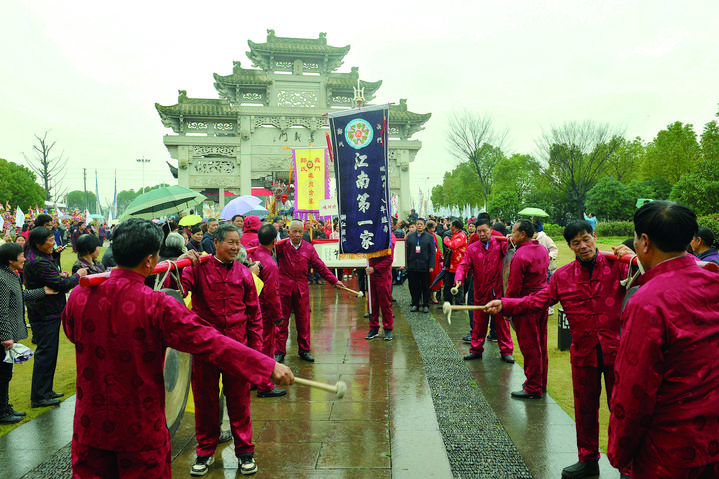
鄭氏家儀大典暨祭祖活動(dòng),近千后裔傳承孝義文化。(CFP供圖)
義門首倡同居者鄭綺就是一位著名的孝子。據(jù)《宋史》載,鄭綺之父鄭照,蒙冤系獄當(dāng)治死罪。鄭綺上疏郡守,請(qǐng)以身代。郡守感而察之,冤情得以大白。又其母張氏患風(fēng)攣長(zhǎng)期臥床,鄭綺像看護(hù)嬰兒般照顧母親,母親如廁必抱就之,長(zhǎng)達(dá)三十年不懈。
關(guān)于“義”,首先表現(xiàn)為兄弟之間的友愛(ài)關(guān)系。家族史上有多次“兄弟爭(zhēng)死”的事跡很讓人感動(dòng)。鄭綺五世孫鄭德圭,與弟德璋孝友甚篤。德璋被仇家陷以死罪,要逮至揚(yáng)州。德圭知道后,毅然代弟行。德璋聞?dòng)崳泵σ宦纷汾s,追上后兩人爭(zhēng)欲就死,德圭佯作應(yīng)允以緩弟之行,卻于深夜?jié)撏鶕P(yáng)州。及德璋追至,德圭已死于獄中。德璋慟哭欲絕,負(fù)柩歸葬,守墓兩年。
鄭義門“義”的精神,還從族內(nèi)推廣到族外,這就是把“積善”付諸實(shí)踐的種種義舉。
早在北宋靖康年間,天災(zāi)人禍,饑民流離失所者甚眾。鄭綺之祖鄭淮賣田千余畝救濟(jì)貧民,直接導(dǎo)致家道中落。后來(lái),人稱其所居之地為“仁義里”。元代至元年間,民多饑乏。鄭德璋開(kāi)倉(cāng)與鄉(xiāng)里共食,全活甚眾。
上述種種,足可表明鄭義門那種尊祖敬宗、孝順父母、兄弟同心、鄉(xiāng)鄰親睦以及樂(lè)善好施的孝義家風(fēng)。
仕德嚴(yán)厲,173人為官清廉
鄭義門的孝義家風(fēng)還體現(xiàn)在對(duì)家族成員品行方面的規(guī)定上。比如,《規(guī)范》中對(duì)于男性不同身份的族人有“隱德”“仕德”“耕德”的要求。關(guān)于“仕德”有如下規(guī)定:
“子孫器識(shí)可以出仕者,頗資勉之。既仕,須奉公勤政,毋蹈貪黷,以忝家法。任滿交代,不可過(guò)于留戀;亦不宜恃貴自尊,以驕宗族。仍用一遵《家范》,違者,以不孝論。”(《規(guī)范》八十六則)
“子孫倘有出仕者,當(dāng)早夜切切以報(bào)國(guó)為務(wù)。撫恤下民,實(shí)如慈母之保赤子。有申理者,哀矜懇惻,務(wù)得其情,毋行苛虐。又不可一毫妄取于民。若在任衣食不能給者,公堂資而勉之;若廩祿有余,亦當(dāng)納之公堂,不可私于妻孥,競(jìng)為華麗之飾,以起不平之心。違者,天實(shí)臨之。”(《規(guī)范》八十七則)
“子孫出仕有以贓墨聞?wù)撸鷦t于《譜圖》上削去其名,死則不許入祠堂。”(《規(guī)范》八十八則)
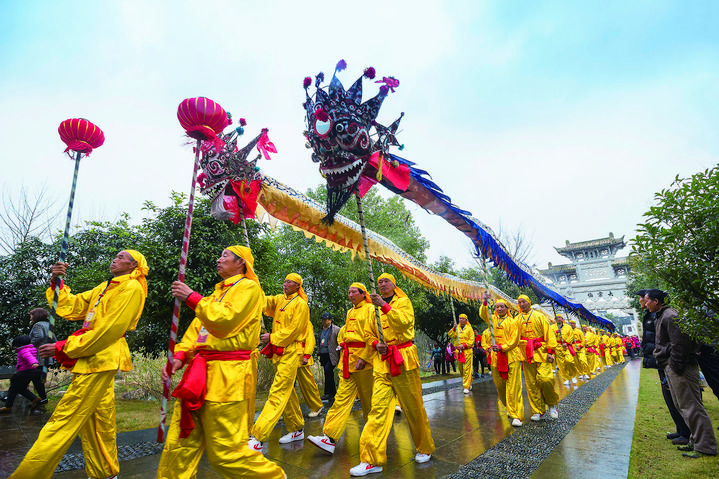
踩街隊(duì)伍經(jīng)過(guò)鄭義門牌坊群。?張浩鉞?攝
《規(guī)范》說(shuō)得很明白,不管你做多大的官,也仍然是鄭家的子孫,仍然要受鄭氏家規(guī)的管束。把“仕德”的要求也納入到“孝義”的體系當(dāng)中,如果“恃貴自尊,以驕宗族”是要以“不孝”論處的。如有貪腐者,不僅不再認(rèn)他為鄭氏子孫,而且“削去其名”,至死都不能原諒。應(yīng)當(dāng)說(shuō),這在封建社會(huì)是相當(dāng)嚴(yán)厲的。
鄭氏家族遵循的這種仕德,的確保證了子孫宦跡清明、仕途平安。從宋朝至清朝,鄭氏家族共有173人出仕,最高位至禮部尚書(shū),沒(méi)有一人因貪墨被罷官。
應(yīng)該說(shuō),《鄭氏規(guī)范》及“鄭義門”現(xiàn)象是中國(guó)傳統(tǒng)社會(huì)的產(chǎn)物,是特定時(shí)代在家族領(lǐng)域和家庭關(guān)系上的具體體現(xiàn),具有濃厚的家族宗法色彩。
時(shí)至今日,其間的封建糟粕無(wú)疑是要摒棄的。但是,家庭在整個(gè)社會(huì)結(jié)構(gòu)中的重要地位沒(méi)有變,“國(guó)之本在家”“家齊而后國(guó)治”的道理也沒(méi)有變。
鄭氏家族數(shù)百年來(lái)一以貫之,把一個(gè)家庭的家規(guī)發(fā)展成整個(gè)家族的規(guī)范,在培養(yǎng)家庭成員良好德行、塑造民族文化心理、維護(hù)社會(huì)和諧穩(wěn)定等方面,都起到了積極的作用,有著深遠(yuǎn)的歷史意義和重大的現(xiàn)實(shí)意義。
Noble Character and High Prestige
The Zheng-surnamed clan based in Zhengzhai Town, Pujiang County in Jinhua, which is a key city in central Zhejiang Province, is a wonderful symbolization of how family tradition can be passed down from one generation to another and can influence the character-building of the community and beyond. Cao Juren (1900-1972), a celebrated journalist and writer born in Pujiang, pointed out that the legacy of the Zheng’s clan was a most glorious chapter in the history of Pujiang.
It is written in history that the Zheng clan lived together in a large compound for fifteen generations through the hundreds of years of the Song (960-1279), the Yuan (1279-1368) and the Ming (1368-1644) dynasties.
The clan’s spiritual pillar that remained strong and effective throughout generations and held the clan together is its Family Code, created in written form by Zheng Dezhang, the head of the feudal household’s fifth generation in Pujiang, and continuously enriched and revised based on experiments and implementations to the letter in everyday life. Such an introspective self-disciplinary process also made the clan’s Family Code a paragon in terms of parental instruction in the ancient China.
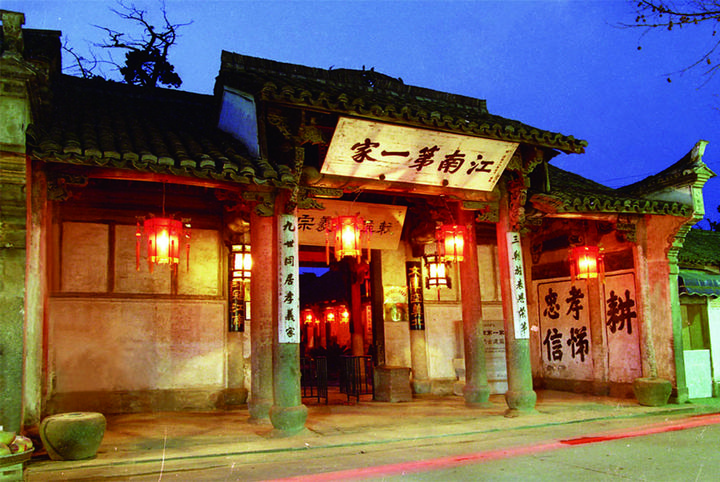
鄭義門掠影。
Zheng Qi and Zheng Yun, representing the first generation of the clan in Pujiang, made filial piety the number one priority in family management, and promoted virtues such as diligence and brotherly love for all other family members. “Anyone failing in the execution of filial piety and undermining the family unity shall be kicked out and severely punished,” Zheng Qi warned in his will.
A formal Regulations of Zheng’s Clan that includes 58 rules and regulations was put together by Zheng Wenrong, the son of Zheng Dezhang, who proposed to “rule the family by law”. The Regulations was further amended by Zheng Wenrong’s two sons.
In the earlier years of the Ming, Zheng Tao, a member of the clan’s 8th generation, added a detailed reward and punishment scheme to the regulations, bringing the number of rules to as many as 168. As the mentor to the family, Song Lian (1310-1381), a political adviser to the Ming dynasty founder, also contributed to the finalization of the clan’s Family Rules and Regulations by incorporating Confucian thoughts into the family code.
The final version’s 168 regulations and rules cover 10 categories including parental instruction, moral character self-cultivation, etiquette details gauging the relation between siblings and with neighbors, and female members’ self-regulatory issues. With almost all aspects of family life covered and all details specified clearly for precise execution, the book won the heart of Zhu Yuanzhang (1328-1398), the founder of the Ming, who ordered the Ministry of Rites to refer to the book for the making of a national scheme. The recognition from Zhu Yuanzhang also led to the heyday of the Zheng clan.
“Xiao” (孝, filial piety) and “Yi” (義, righteousness) are the core of the clan’s Family Regulations and Rules. The two core principles can also be construed as a “communal” concept that encourages family unity and loyalty. For example, Zheng Qi risked his life to save his father who was wronged and sentenced to death, and took care of his bed-ridden mother for 30 years without any complaint.
The sibling love between Zheng Degui and Zheng Dezhang was also a tearjerker, illustrating how the fraternal love between the two could be so strong that it became a life-and-death bond that could not separate the two till death did them apart.
The family’s communal spirit also produced many philanthropists throughout the generations. In the Jingkang years of the Northern Song (960-1127), Zheng Huai sold some family property to help the poor and homeless. During the famine in the Zhiyuan years of the Yuan Dynasty, Zheng Dezhang opened the family granary to neighbors without hesitation, and saved the life of many.
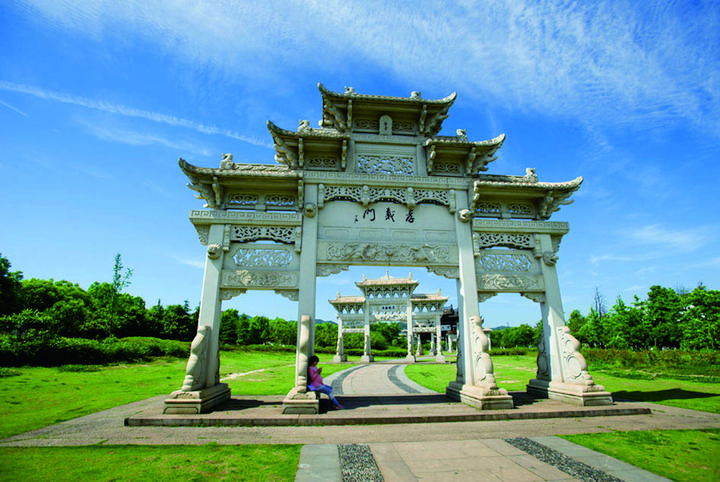
鄭義門牌坊。
The Family Rules and Regulations clearly specifies that no one in the family can be exempted from punishment, regardless of one’s social status or official ranking, and those who do not behave themselves in their official posts will be kicked out of the family and will never be forgiven morally. The name of the offender will also be erased from the family book. Such punishment is among the harshest in the feudal China, and ensured the “cleanness” of the family’s reputation.
What stands out from The Family Rules and Regulations is that the document specifies guidelines for members of the clan to follow when serving as government officials. The guidelines worked effectively and the members of the clan were able to stay away from negligence and corruption.
It is true that such a feudal-style family management scheme has become outdated in modern China, but it is also true that the long line of dedicated, self-disciplinary and philanthropic individuals who lived by lofty thoughts set a brilliant example indicating how one could benefit from self-discipline and hardworking. The clan’s example sowed noble seeds in town. And it is therefore true that the clan’s determination in character building will certainly benefit more individuals and communities in Pujiang.
